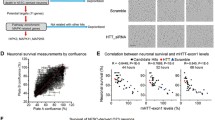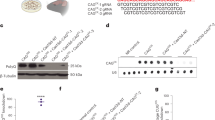Abstract
According to the recent controversy regarding the effects of minocycline in the R6/2 transgenic model of Huntington’s disease (HD), this tetracycline has been re-evaluated in another model, the N171-82Q strain. Ten miligrams per kilogram minocycline was given daily from the age of 2 mo, corresponding to an early symptomatic stage. We did not observe improvement in survival, weight loss, or motor function in treated transgenic mice. In addition, minocycline failed to mitigate the ventricle enlargement as well as the striatal and cortical atrophies induced by the transgene. Using high-performance liquid chromatography, it was observed that minocycline was similarly present in the plasma and the brain of both wild-type and N171-82Q mice following 14 daily injections. Using Western blot, we show that the increased expression of procaspase-1 induced by the transgene in the cortex was significantly reduced by the antibiotic. Combining together these data support that despite minocycline crosses blood-brain barrier in N171-82Q mice and displays an expected effect on procaspase-1 expression, it does not provide protection in this HD model. These in vivo results are in accordance with in vitro data, since minocycline failed to protect against mutated Huntingtin in an inducible PC12-clone expressing exon1 of mutated Huntingtin103Q. Altogether, the present data does not support minocycline as a beneficial drug for HD.
Similar content being viewed by others
References
Aiken C. T., Tobin A. J., and Schweitzer E. S. (2004) A cell-based screen for drugs to treat Huntington’s disease. Neurobiol. Dis. 16, 546–555.
Apostol B. L., Kazantsev A., Raffioni S., et al. (2003) A cell-based assay for aggregation inhibitors as therapeutics of polyglutamine-repeat disease and validation in Drosophila. Proc. Natl. Acad. Sci. USA 100, 5950–5955.
Bantubungi K., Jacquard C., Greco A., et al. (2005) Minocycline in phenotypic models of Huntington’s disease. Neurobiol. Dis. 18, 206–217.
Beal M. F. (2005) Mitochondrial take center stage in aging and neurodegeneration. Ann. Neurol. 58, 495–505.
Blum D., Chtarto A., Tenenbaum L., Brotchi J., and Levivier M. (2004) Clinical potential of minocycline for neurodegenerative disorders. Neurobiol. Dis. 17, 359–366.
Bonelli R. M., Heuberger C., and Reisecker F. (2003) Minocycline for Huntington’s disease: an open label study. Neurology 60, 883–884.
Chen M., Ona V. O., Li M., et al. (2000) Minocycline inhibits caspase-1 and caspase-3 expression and delays mortality in a transgenic mouse model of Huntington disease. Nat. Med. 6, 797–801.
Cornet S., Spinnewyn B., Delaflotte S., et al. (2004) Lack of evidence of direct mitochondrial involvement in the neuroprotective effect of minocycline. Eur. J. Pharmacol. 505, 111–119.
Diguet E., Rouland R., and Tison F. (2003) Minocycline is not beneficial in a phenotypic mouse model of Huntington’s disease. Ann. Neurol. 54, 841–842.
Diguet E., Fernagut P. O., Wei X., et al. (2004) Deleterious effects of minocycline in animal models of Parkinson’s disease and Huntington’s disease. Eur. J. Neurosci. 19, 3266–3276.
Du Y., Ma Z., Lin S., et al. (2001) Minocycline prevents nigrostriatal dopaminergic neurodegeneration in the MPTP model of Parkinson’s disease. Proc. Natl. Acad. Sci. USA 98, 14,669–14,674.
Hersch S. M. and Ferrante R. J. (2004) Translating therapies for Huntington’s disease from genetic animal models to clinical trials. NeuroRx. 1, 298–306.
Hersch S., Fink K., Vonsattel J. P., and Friedlander R. M. (2003) Minocycline is protective in a mouse model of Huntington’s disease. Ann. Neurol. 54, 841–843.
Hockly E., Beunard J. L., Lowden P. A., and Bates G. P. (2003) Reply. Ann. Neurol. 54, 842–843.
Hodl A. K. and Bonelli R. M. (2005) Huntington’s disease and minocycline. Mov Disord. 20, 510–511.
Huntington Study Group. (2004) Minocycline safety and tolerability in Huntington disease. Neurology 63, 547–549.
Schilling G., Becher M. W., Sharp A. H., et al., (1999) Intranuclear inclusions and neuritic aggregates in transgenic mice expresing a mutant N-terminal fragment of huntingtin. Hum. Mol. Genet. 8, 397–407.
Smith D. L., Woodman B., Mahal A., et al. (2003) Minocycline and doxycycline are not beneficial in a model of Huntington’s disease. Ann. Neurol. 54, 186–196.
Stack E. C., Smith K. M., Ryu H., et al. (2006) Combination therapy using minocycline and coenzyme Q10 in R6/2 transgenic Huntington’s disease mice. Biochim. Biophys. Acta 1762, 373–380.
Thomas M., Ashizawa T., and Jankovic J. (2004) Minocycline in Huntington’s disease: a pilot study. Mov. Disord. 19, 692–695.
Wang X., Zhu S., Drozda M., et al. (2003) Minocycline inhibits caspase-independent and-dependent mitochondrial cell death pathways in models of Huntington’s disease. Proc. Natl. Acad. Sci. USA 100, 10,483–10,487.
Yu Z. X., Li S. H., Evans J., Pillarisetti A., Li H., and Li X. J. (2003) Mutant huntingtin causes context-dependent neurodegeneration in mice with Huntington’s disease. J. Neurosci. 23, 2193–2202.
Author information
Authors and Affiliations
Corresponding author
Additional information
Are joint senior authors.
Rights and permissions
About this article
Cite this article
Mievis, S., Levivier, M., Communi, D. et al. Lack of minocycline efficiency in genetic models of Huntington’s disease. Neuromol Med 9, 47–54 (2007). https://doi.org/10.1385/NMM:9:1:47
Received:
Revised:
Accepted:
Issue Date:
DOI: https://doi.org/10.1385/NMM:9:1:47




